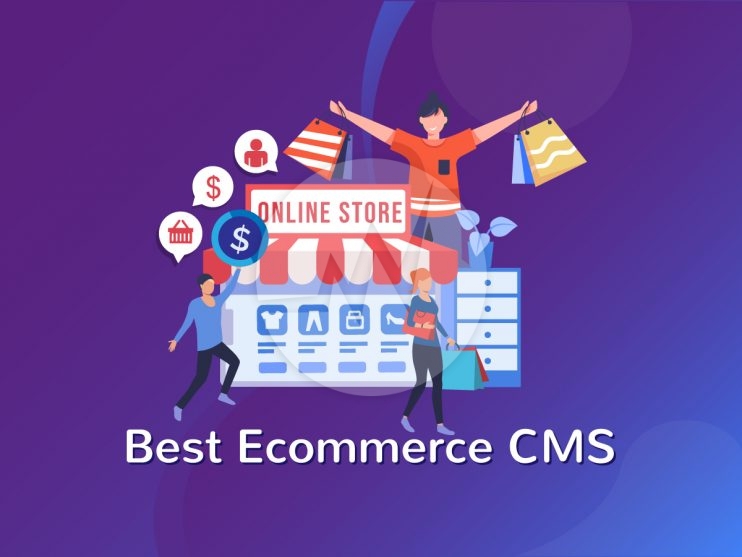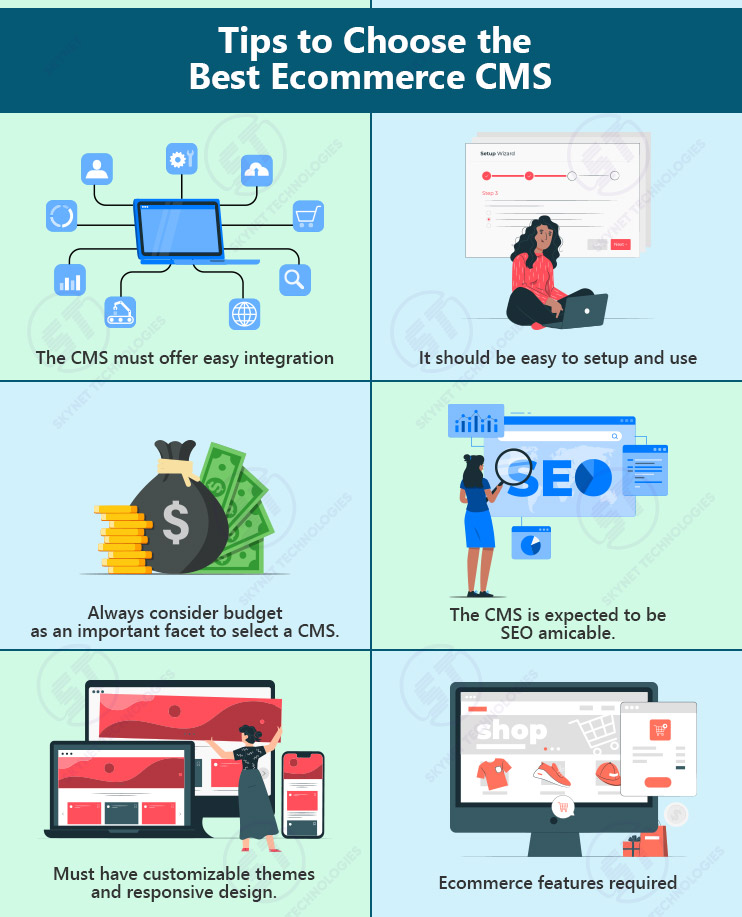How to choose the best ecommerce CMS?

What is that one crucial facet to execute a smooth ecommerce business?
Well, a CMS is the most important part of an ecommerce website. It helps you to create, edit, and update your ecommerce content. Best ecommerce CMS has some required features that are boon for an ecommerce business.
The CMS not only assists organizations to build an ecommerce website with the help of amazing templates, but it also has several in-built features and functionalities that uplift the website’s SEO. With a minimal to the negligible learning curve, CMS allows you to run a fully functional and secured ecommerce website.
There are several CMS available in the market. However, organizations must choose the one which suits their business requirements most. They say, one size doesn’t fit all. Similarly, no two ecommerce businesses can choose the same CMS to build their website.
Let’s see, what you should check in a CMS before finalizing it for your ecommerce website.
YOU MAY ALSO LIKE: BigCommerce VS Shopify
Tips to Choose the Best Ecommerce CMS
- The CMS must offer easy integration
- It should be easy to setup and use
- Always consider budget as an important facet to select a CMS.
- The CMS is expected to be SEO amicable.
- It must have customizable themes and responsive design.
- Ecommerce features is required in a CMS that you are looking to create an ecommerce website.

YOU MAY ALSO LIKE: Ecommerce SEO Strategies
Best ecommerce CMS
1. WordPress
WordPress is among the popular CMS to build an ecommerce website. The most compelling part of this CMS is its open-source availability with myriad useful features. Initially, it was built for blog publishing, but gradually evolved and become a go-to place for ecommerce development as well.
It has customizable themes for almost every type of ecommerce website. WordPress has a range of plugins as well that are important for ecommerce creation. Themes can be customized easily without making changes in core code. Thus, altering look and functionality of WordPress ecommerce website becomes easier.
WordPress has more than 50k free plugins to increase functionalities of the ecommerce website and number of premium plugins is 1500+. Using these plugins, you can take help in personalization and customize your ecommerce website’s SEO and UX.
One of the exceptional plugins of WordPress is WooCommerce, which is specially designed to manage ecommerce stores. You only have to download it to start with and you can manage it with your WordPress account only.
To manage products in WooCommerce, you can add drop down menus, images, check boxes easily without changing code part. WooCommerce also has Quick View feature that allow customers to take a closer view of product and its details quickly. Other than WooCommerce, WordPress itself has many plugins to manage products such as impleCode.
WordPress team also worked on including accessibility in core code of the platform to improve its inclusivity. Its accessibility coding standard state that – all new or updated WordPress code must conform to WCAG 2.0 level.
WordPress also has many tools that help in automating ecommerce websites to diagnose website problems, fix them, and even record sales numbers. With multisite, multi-user feature, you can control more than one account from single dashboard. And what else, WordPress has proven it as an outstanding CMS for an ecommerce website.
YOU MAY ALSO LIKE: Guide for WordPress Ecommerce Development
2. Adobe Commerce
Adobe Commerce (Formally Magento) is made for ecommerce only. With ample features for ecommerce, Adobe Commerce is a scalable and flexible CMS.
Even for a colossal database with thousands of products and transactions, Adobe Commerce works impeccably. With amazing capabilities of modern ecommerce like headless commerce and experience manager, Adobe Commerce has set the bar for its competitors.
The multi-vendor multi-channel marketplace can be efficiently built using Adobe Commerce to manage multiple channels and brands from a single account. It helps with real-time minute analytics to deliver more relevant marketing data.
Adobe Commerce uses AI and advanced data sharing capabilities in order to create personalized B2B and B2C experiences. Its drag-and-drop tool make content creation easy, and personalization can be done straightforwardly for specific customer segments.
Creating headers, banners, buttons, dividers, etc. is simple to give a compelling look to web pages. Its grid system helps you to move different elements and experiment with different designs even without touching code.
AI driven product recommendations increase conversions. For payment process, Magento adheres to PCI DSS, 3D Secure transactions, and latest data encryption standards.
YOU MAY ALSO LIKE: Magento Store Design
3. Shopify
Another brilliant option for ecommerce is Shopify. With a simple learning curve and minimum complexities, it helps you to create an exceptional ecommerce website and application.
Shopify has made ecommerce management a cinch with amazing features and an array to professional themes. All the themes are easily customizable to give unique look and feel to your ecommerce store.
You can add, update, and organize products easily and create an enticing product catalogue by using drag-and-drop tool. Along with product management, Shopify also made its shopping cart a reason for conversion. With flexible shipping rates, a range of payment gateways, automatic tax calculation for product price transparency, and much more features, Shopify has an exceptional shopping cart.
It has design tools that assist in building a website with desired UI and UX. This CMS also has an app store to uplift the level of your ecommerce store. You can add more features and functionalities to your ecommerce store with the help of apps. For example, Wishlist Plus assists visitors to bookmark their desired products and if they leave the session in between, it is easier for them to pick up the same products when they come back.
Likewise, Shopcodes app is for creating scannable QR codes for your ecommerce store, Blog Studio is for blogging and the list goes on.
Moreover, tracking sales, transactions, sessions, etc. is simplest with Shopify. Choose this CMS for a flawless ecommerce.
4. Drupal
Drupal is an outstanding CMS, which is open source. It is a little difficult to learn and work on, however, all effort pays off in the form of a flawless ecommerce website eventually. Once the ecommerce website setup is done, then you are all sorted. Amazing to scale and manage with its powerful tools for ecommerce.
Drupal has features like easy content authoring, sturdy security, and amazing performance. It is built on the core principle of modularity, and which is why Drupal is flexible to the next level. For dynamic web experiences, its tools help in building structured content.
Drupal 10 brought more versatility and made it best digital experience platform (DXP) on the web. Its decouple functionality helps you to integrate any front-end with Drupal-built solution and it is also helpful in scaling content across silos. Secured and multi-lingual Drupal has marketing automation tools to outreach a wider segment of audiences.
With various modules and themes, you can increase its functionalities and customize as per your wish. It has Drupal bundles for distributions, which can be used as starter-kit. You can also integrate Drupal with external services to enhance the platform’s abilities.
It is a platform that combines content, products, and order management together in a multi-lingual, and multi-currency ecommerce website.
It helps you design rich product display pages, its search interface is amazingly robust, and with smooth checkout flow, Drupal is a good choice ecommerce CMS.
YOU MAY ALSO LIKE: Choose Drupal CMS
5. Joomla
Joomla is another efficient CMS, which is built by developers voluntarily from all over the world. It is search-engine friendly, multilingual, mobile responsive, flexible and scalable. With multi-user permission levels and unlimited designs, it is one of the finest CMS we have around.
This CMS has several free plugins and templates that allow you to create an ecommerce website suitable for your business requirements. Its extensions are categorised as plugins based on their functions such as templates, languages, modules, libraries, components, etc.
Extensions help to improve product management, sales management, checkout process with required features for ecommerce.
Joomla has made ecommerce setup hassle-free. It has many components that specially created for ecommerce such as VirtueMart, HikeShop, MijoShop, etc. And its integration with third-party extensions is also simple. Joomla can be a good choice to build an ecommerce website.
6. BigCommerce
BigCommerce is a full-featured CMS for ecommerce which allow you to build and modify your ecommerce website. With simplest content management and complete control on your ecommerce website, you will have one of the finest ecommerce CMS.
It has made product management hassle-free by providing easy options to add and update products in your ecommerce store and that too for businesses with huge products list.
Inventory management is also a breeze with BigCommerce. It offers centralized inventory management to manage orders efficiently. Besides, BigCommerce integrates with 65+ payment gateways including PayPal, Apple Pay, Amazon Pay, Stripe, and many more.
It also has useful SEO tools that helps in optimizing your ecommerce website for search engines. BigCommerce Shipping manager assists you to manage every order shipping and delivery with some of the leading carriers such as FedEx, UPS, etc.
In short, it is a proven CMS to rely on.
7. OpenCart
One more popular open-source platform for ecommerce is OpenCart. It has 13k+ modules and themes to start, expand, and grow your ecommerce business. All major payment gateways and shipping carriers integrate with OpenCart.
It has sturdy store management that assists in managing products, customers, orders, taxes, etc. Its Product Manager extension allows editing multiple products at a time, it supports multiple languages, product show/hide column is there, filters like manufacturer, category are available to make product management effective. You can also create custom fields for your products in OpenCart.
X-Shipping is one of the popular extensions for custom shipping methods along with many other extensions. OpenCart has payment gateways like Braintree, PayPal, Square, etc. Moreover, community and dedicated support is available for all the OpenCart users.
Choose a CMS smartly to build a flawless ecommerce website
Amidst several CMS options, choosing the right one for your business can be relatively difficult. You can compare them and check if they fulfil your business requirements or not. Also, find the reviews available on the internet and learn everything about the platform before finalizing one.
If the CMS has a support system, consider using it for ecommerce website development because, in case of any technical crisis, you will have a reliable place to seek help from.
Taking assistance from an ecommerce development company is advisable in case of confusion. Skynet Technologies can help you to choose the right CMS to achieve your business goals by reaching the right audiences. Skynet Technologies provides various ecommerce solution on different CMS including Drupal, WordPress and magneto. Fill out the form given below to request a free quote or mail it at hello@skynetindia.info



